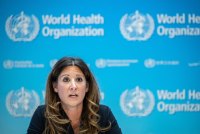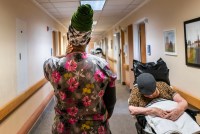Latest Morning Briefing Stories
WHO Overturns Dogma on Airborne Disease Spread. The CDC Might Not Act on It.
After grave missteps in the covid pandemic, the World Health Organization revisited the science and now confirms that many respiratory viruses are inhaled as airborne particles. The new framework implies that stopping transmission relies on costly measures like ventilation and masking.
AC, Power Banks, Mini Fridges: Oregon Equips Medicaid Patients for Climate Change
Oregon is giving Medicaid patients air conditioners and other equipment to help them cope with soaring heat, smoky skies, and other dangers of climate change. Oregon health officials hope to show other states and the federal government that they can save lives and money.
Toxic Gas Adds to a Long History of Pollution in Southwest Memphis
People across the nation claim cancer-causing emissions from local sterilizing plants are making them sick. It’s an example of environmental racism, say residents of one predominantly Black area in southwest Memphis, Tennessee, where life expectancy is much shorter than county and state averages.
Sign Here? Financial Agreements May Leave Doctors in the Driver’s Seat
Agreeing to an out-of-network doctor’s own financial policy — which generally protects their ability to get paid and may be littered with confusing insurance and legal jargon — can create a binding contract that leaves a patient owing.
In this episode of “An Arm and a Leg,” host Dan Weissmann explores what the fallout from a cyberattack says about antitrust concerns in health care.
What Florida’s New 6-Week Abortion Ban Means for the South, and Traveling Patients
Florida has served as a haven for Southern pregnant women with little or no access to abortions. But the Florida Supreme Court upheld a six-week abortion restriction that begins in May — so now women across much of the South seeking abortions will have to look farther afield.
Exposed to Agent Orange at US Bases, Veterans Face Cancer Without VA Compensation
The Department of Veterans Affairs has long given vets who served in Vietnam disability compensation for illness connected to Agent Orange harm. But those exposed at U.S. bases are still waiting for the same benefits.
Millions Were Booted From Medicaid. The Insurers That Run It Gained Medicaid Revenue Anyway.
Big health insurers that have contracts with state Medicaid programs find themselves making more money even as enrollment in Medicaid programs has dropped. Here’s why.
California Is Investing $500M in Therapy Apps for Youth. Advocates Fear It Won’t Pay Off.
California launched two teletherapy apps as part of the governor’s $500 million foray into health technology with private companies. But the rollout has been so slow that one company has yet to make its app available on Android, and social workers worry youths who need clinical care won’t get referrals.
Mandatory Reporting Laws Meant To Protect Children Get Another Look
The state is looking at ways to weed out false reporting of child abuse and neglect as the number of reports reaches a record high.
Genetics Studies Have a Diversity Problem That Researchers Struggle To Fix
Researchers in Charleston, South Carolina, are trying to build a DNA database of 100,000 people to better understand how genetics affects health risks. But they’re struggling to recruit enough Black participants.
What the Health? From KFF Health News: Abortion — Again — At the Supreme Court
For the second time in as many months, the Supreme Court heard arguments in an abortion case. This time, the justices are being asked to decide whether a federal law that requires emergency care in hospitals can trump Idaho’s near-total abortion ban. Meanwhile, the federal government, for the first time, will require minimum staffing standards for nursing homes. Alice Miranda Ollstein of Politico, Tami Luhby of CNN, and Joanne Kenen of Johns Hopkins University and Politico Magazine join KFF Health News’ Julie Rovner to discuss these stories and more. Plus, for “extra credit,” the panelists suggest health policy stories they read this week they think you should read, too.
Tire Toxicity Faces Fresh Scrutiny After Salmon Die-Offs
Tires emit huge volumes of particles and chemicals as they roll along the highway, and researchers are only beginning to understand the threat. One byproduct of tire use, 6PPD-q, is in regulators’ crosshairs after it was found to be killing fish.
FTC Chief Says Tech Advancements Risk Health Care Price Fixing
Technological advances including the widespread use of algorithms make it easier for companies to fix prices without explicitly coordinating, Lina Khan said at a KFF event.
Unsheltered People Are Losing Medicaid in Redetermination Mix-Ups
Some of the nearly 130,000 Montanans who have lost Medicaid coverage as the state reevaluates eligibility are homeless. That’s in part because Montana kicked more than 80,000 people off the program for technical reasons rather than income ineligibility. For unhoused people who were disenrolled, getting back on Medicaid can be extraordinarily difficult.
California Legislators Debate Froot Loops and Free Condoms
California state lawmakers this year are continuing their progressive tilt on health policy, debating bills banning an ingredient in Froot Loops and offering free condoms for high schoolers.
Biden Administration Sets Higher Staffing Mandates. Most Nursing Homes Don’t Meet Them.
The staffing regulation was disparaged by the industry as unattainable. Patient advocates say it doesn’t go far enough. Labor unions welcomed the requirement.
Rural Jails Turn to Community Health Workers To Help the Newly Released Succeed
To reduce recidivism, some rural counties are hiring community health workers or peer support specialists to connect people leaving custody to mental health resources, substance use treatment, medical services, and jobs.
Medical Providers Still Grappling With UnitedHealth Cyberattack: ‘More Devastating Than Covid’
Medical providers say they’re still coping with the Change Healthcare cyberattack disclosed in February even though parent company UnitedHealth Group reported that much is back to normal and its revenue is up over last year.
He Thinks His Wife Died in an Understaffed Hospital. Now He’s Trying to Change the Industry.
Nurses are telling lawmakers that there are not enough of them working in hospitals and that it risks patients’ lives. California and Oregon legally limit the number of patients under a nurse’s care. Other states trying to do the same were blocked by the hospital industry. Now patients’ relatives are joining the fight.


























